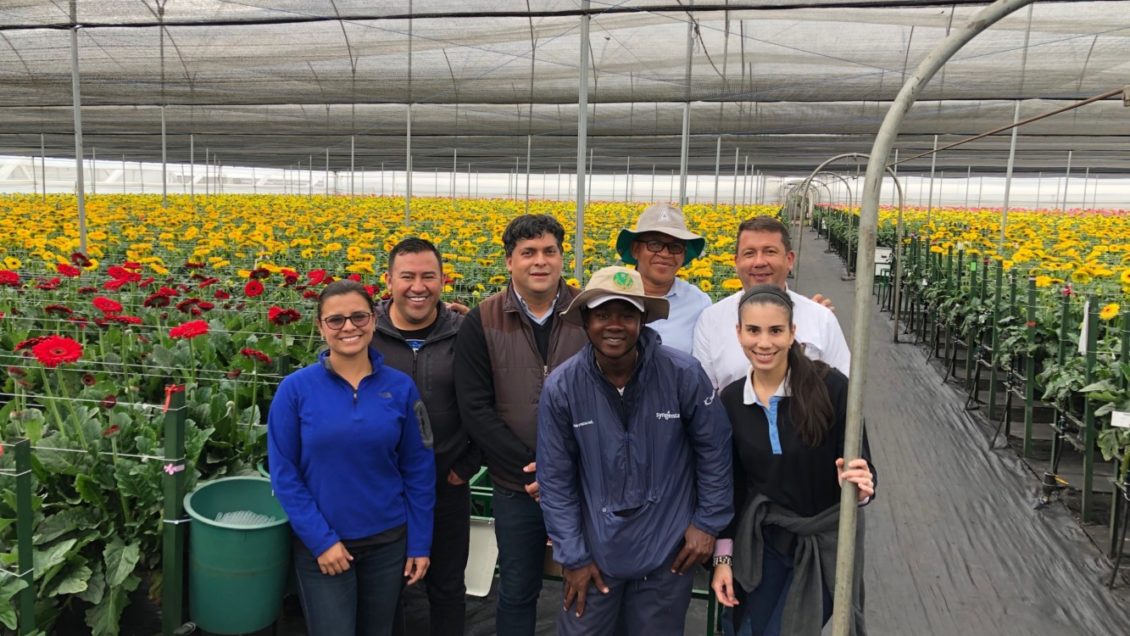Melissa Muñoz, a doctoral student and research assistant with the Plant and Environmental Sciences department at Clemson University, left her mark at the 2019 Siflor International Symposium of Horticulture in Quito, Ecuador, by presenting on her rose crop and Botrytis fungus research for the third consecutive year.

The two previous years, Muñoz presented at the 2017 Proflora horticulture trade show in Bogota, Colombia and the 2018 Siflor conference in Medellin, Colombia.
The Siflor International Symposium brings together industry professionals in floriculture to promote the education and training of students and growers and to advance the cut flower market in Colombia and Ecuador. The symposium features technical exhibitions on topics like plant disease management and presentations on commercial issues like sea freight. Last year, on November 27-28, the symposium drew a crowd of nearly 700 and featured speakers from as abroad as Spain and the Netherlands.
“[These conferences] lead to discussions that give not only me but Dr. Faust, Dr. Schnabel and every other person that works on this project, points of view that we perhaps don’t consider,” Muñoz said. “It’s a nice way to not only bring knowledge to them… they also bring knowledge to us and bring us new ideas.”
James Faust is an associate professor of horticulture who specializes in floriculture physiology, with a focus on quantifying the effects of environmental and cultural factors on the production of ornamental greenhouse crops. He has served as Muñoz’s advisor since she began her graduate research at Clemson.
Guido Schnabel is a plant pathologist at Clemson, who serves as a professor in the Plant and Environmental Sciences department and as the Associate Editor of the international journal Pesticide Biochemistry and Physiology. He has studied the pathogens of fruit crops for over 25 years.
Muñoz described the Siflor symposium as an important platform for conveying the difficulties she and her colleagues have encountered in the industry, like fungi resistance to their management techniques.
“To me, it’s very important [to be present at these conferences] because I’m from Colombia and I know a little about the floriculture industry, but I’m not there all the time to see what’s going on,” she said. “So these conferences and symposia form a really good bridge between me and the growers and are a really nice way to target a lot of them.”
Muñoz has been researching plant pathogens since 2016, when she started her master’s program at Clemson University. She graduated with a B.S. in agronomy from the National University of Colombia at Medellin and finished her master’s in 2018. She is currently pursuing her doctoral degree at Clemson and studying management techniques for the Botrytis fungus on cut roses.
She has investigated how calcium can preserve cut roses from the Botrytis fungus, which produces a visible rot on the crop’s tissue. She cautions that a fungicide spray only protects the exterior of the crop, leaving the interior petals vulnerable to fungal growth. Meanwhile, dipping cut roses in calcium may improve their longevity for shipping and thereby protect Colombian growers from losses.
American wholesale and retail florists who source their crops from Colombia also flourish under this research, which Faust explains is why the American Floral Endowment supports Clemson’s research program.
“When we solve industry problems, it benefits the whole industry,” he said.
Faust attributed the research’s success to Muñoz’s compassion for industry workers.
“Melissa has fully embraced her research project and has recognized that her work has the potential to make a tremendous impact on the lives of people who make their living growing flowers,” Faust said. “Melissa sincerely cares about the people that she works with, both the professional growers and her lab colleagues.”
Faust said growers in South America have already begun to implement techniques inspired by Muñoz’s research. Funded by American and Colombian flower growers through the American Floral Endowment—and from whom Muñoz received a $10,000 scholarship in Spring 2018—her research required that the experimentation first take place in South America, where treated rose crops were harvested and shipped to Clemson for evaluation. Because of the project’s success, Clemson has received three additional grants for cut flower research totaling nearly $500,000.
“This project would not have been successful without Melissa’s ability to coordinate the experiments abroad,” Faust said.
Muñoz wants to continue in academia after she graduates, as a research professional or an associate professor of horticulture. She has also entertained the thought of working in the floriculture industry, but she ultimately wants to continue research in plant pathology.
-END-
Get in touch and we will connect you with the author or another expert.
Or email us at news@clemson.edu

